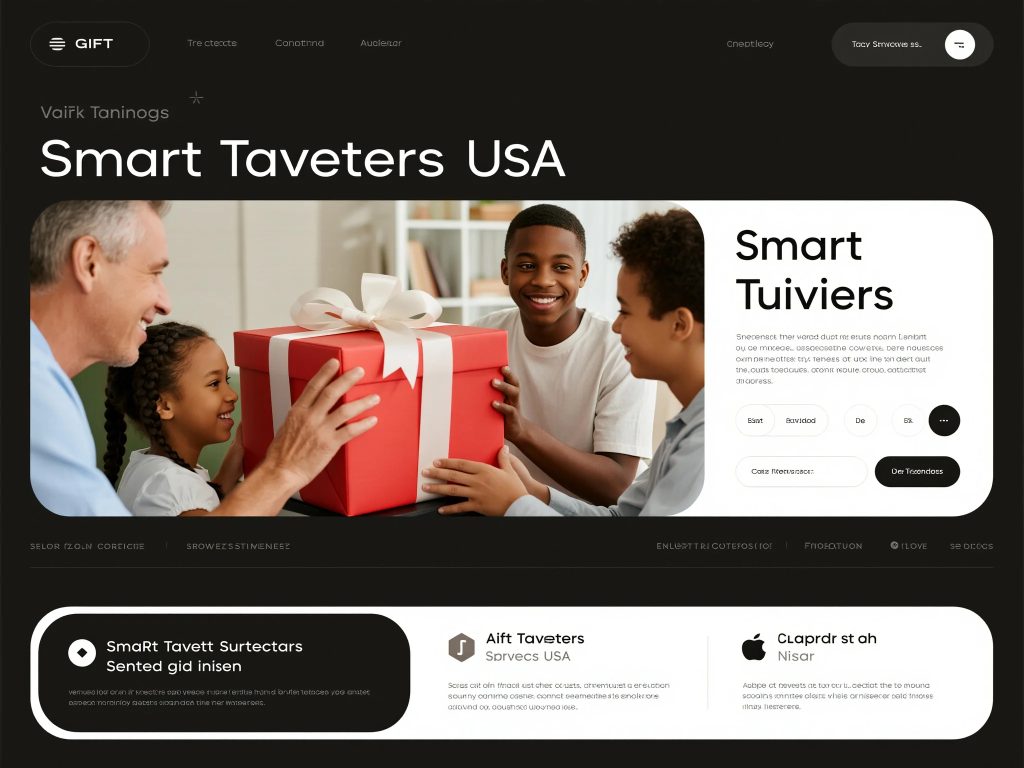Understanding Gift Tax Strategies USA and Wealth Transfer Fundamentals The sophisticated landscape of gift tax strategies USA provides ultra-high-net-worth families with powerful mechanisms to transfer wealth to the next generation while minimizing tax consequences and maximizing the effectiveness of intergenerational wealth transfer through strategic utilization of annual exclusions, lifetime exemptions, and advanced planning techniques that can significantly reduce overall family tax liability over multiple generations. Gift tax planning involves the systematic transfer of assets from senior generation family members to younger generations through carefully structured transactions that take advantage of available exemptions, valuation discounts, and timing strategies to minimize gift tax consequences while achieving
meaningful wealth transfer objectives that support long-term family financial security and prosperity. The effectiveness of gift tax strategies depends on proper planning, timing, and compliance with federal gift tax regulations including annual exclusion limits, lifetime exemption amounts, and generation-skipping transfer tax considerations that require careful navigation to achieve intended wealth transfer benefits while maintaining compliance with complex tax regulations. Professional gift tax planning requires coordination between experienced estate planning attorneys, certified public accountants, and wealth management professionals who understand the intricate interplay between gift tax rules, estate tax planning, and family dynamics to create strategies that achieve optimal tax efficiency while supporting family relationships and long-term wealth management objectives. The regulatory environment for gift tax planning continues to evolve with changes in exemption amounts, tax rates, and anti-avoidance provisions that require ongoing monitoring and potential adjustment of gift tax strategies to maintain effectiveness and compliance with current tax regulations while adapting to changing family circumstances and financial objectives. The selection of appropriate gift tax techniques requires careful analysis of family wealth levels, transfer objectives, asset types, and long-term financial goals to develop customized approaches that provide sustainable tax benefits while supporting overall family wealth management and estate planning strategies that benefit multiple generations. Advanced gift tax planning often involves sophisticated structures and techniques that can provide significant tax advantages while creating opportunities for wealth multiplication and family business succession planning that supports the financial success and security of future generations of family members.High Net Worth Tax Strategies USA and Advanced Transfer Planning The comprehensive implementation of high net worth tax strategies USA for advanced transfer planning encompasses sophisticated approaches that coordinate gift tax planning with broader tax optimization techniques, estate planning strategies, and wealth management objectives to create integrated solutions that minimize overall family tax liability while supporting long-term wealth preservation and transfer goals across multiple generations. High net worth gift tax planning requires careful consideration of multiple tax systems including gift tax, estate tax, generation-skipping transfer tax, and income tax implications that can significantly impact the effectiveness of wealth transfer strategies and require comprehensive analysis to optimize overall tax
efficiency while achieving meaningful wealth transfer objectives. The coordination of gift tax planning with business succession strategies provides additional opportunities for tax optimization through strategic use of business entities, valuation discounts, and ownership transfer techniques that can facilitate wealth transfer while supporting business operations and succession planning objectives that benefit multiple family members and generations. International considerations for high net worth gift tax planning include cross-border tax implications, foreign gift tax rules, and compliance with international reporting requirements that can impact the effectiveness of wealth transfer strategies for families with international assets, business interests, or residence considerations that require specialized expertise and planning. The timing aspects of high net worth gift tax planning involve strategic coordination with market conditions, tax law changes, and family circumstances to optimize the benefits of wealth transfer while maintaining flexibility for changing economic and regulatory environments that could impact long-term planning effectiveness and family financial security. Asset selection for gift tax planning within high net worth families requires careful evaluation of growth potential, income characteristics, and tax implications to ensure that transferred assets provide optimal wealth transfer benefits while supporting overall family wealth management and investment objectives that align with long-term financial goals. The integration of gift tax planning with charitable strategies can provide additional tax benefits while supporting family philanthropic objectives through techniques that combine wealth transfer with charitable giving strategies that enhance overall tax efficiency while creating meaningful charitable impact and family legacy building opportunities that benefit both family members and charitable causes.Estate Tax Minimization Strategies and Gift Planning Integration
The strategic coordination of estate tax minimization strategies with gift tax planning creates comprehensive approaches that address both current wealth transfer objectives and long-term estate tax reduction while supporting family wealth preservation and transfer goals across multiple generations through integrated planning techniques that maximize tax efficiency and wealth transfer effectiveness. Estate tax planning integration with gift tax strategies involves the strategic use of lifetime exemptions, annual exclusions, and valuation techniques to remove assets from the taxable estate while minimizing gift tax consequences and providing ongoing estate tax benefits that complement current wealth transfer objectives achieved through systematic gift tax planning techniques. The timing coordination between estate tax planning and gift tax strategies requires careful analysis of current exemption levels, potential future changes in tax law, and family wealth transfer objectives to optimize the benefits of combined strategies while maintaining flexibility for changing circumstances and regulatory environments that could impact long-term planning effectiveness. Grantor trust strategies provide powerful tools for combining estate tax minimization with gift tax planning by allowing grantors to make gifts to trusts while retaining certain powers that cause trust income to be taxable to the grantor, thereby providing additional wealth transfer benefits through payment of income taxes on behalf of trust beneficiaries while removing trust assets and future growth from the taxable estate. The use of family limited partnerships and limited liability companies in estate tax planning can enhance gift tax effectiveness by providing valuation discounts for transferred interests while facilitating ongoing wealth transfer through partnership distributions and management arrangements that optimize overall family tax efficiency and support long-term wealth management objectives. Generation-skipping transfer tax planning within estate tax minimization strategies can extend the benefits of gift tax planning across multiple generations by utilizing generation-skipping exemptions to transfer wealth to grandchildren and future generations while avoiding transfer taxes and creating long-term wealth transfer benefits that support multi-generational family financial security. The coordination of charitable planning with estate tax minimization and gift tax strategies can provide additional tax benefits while supporting family philanthropic objectives through techniques that combine wealth transfer, estate tax reduction, and charitable giving strategies that enhance overall tax efficiency and family legacy building while creating meaningful charitable impact. The ongoing management and adjustment of integrated estate tax and gift tax strategies requires regular review of tax law changes, family circumstances, and asset performance to ensure continued effectiveness and optimization of both current wealth transfer benefits and long-term estate tax savings that support comprehensive family wealth management objectives and multi-generational financial success.
The sophisticated utilization of dynasty trusts for high net worth families provides powerful mechanisms for perpetual wealth transfer that combine gift tax planning with long-term wealth preservation strategies to create structures that can benefit multiple generations while minimizing transfer taxes and providing ongoing asset protection and wealth management benefits that support family financial security across centuries. Dynasty trusts offer unique advantages for gift tax planning by allowing families to make gifts that utilize generation-skipping transfer tax exemptions while creating trust structures that can continue in perpetuity in certain jurisdictions, thereby providing ongoing wealth transfer benefits and estate tax savings that compound over multiple generations of family members. The establishment of dynasty trusts requires careful consideration of jurisdiction selection, trust terms, and funding strategies to ensure that trust structures provide optimal tax benefits while supporting family objectives and maintaining flexibility for changing circumstances and regulatory environments that could impact long-term trust effectiveness and family wealth management goals. Trust funding strategies for dynasty trusts involve sophisticated gift tax planning techniques including the use of valuation discounts, installment sales, and grantor trust structures that can enhance the effectiveness of wealth transfer while minimizing gift tax consequences and maximizing the amount of wealth that can be transferred to benefit future generations of family members. The ongoing administration of dynasty trusts requires sophisticated trust management, investment oversight, and distribution planning that ensures trust assets continue to grow and provide benefits to beneficiaries while maintaining compliance with trust terms and tax regulations that govern trust operations and beneficiary distributions over extended time periods. Asset protection features of dynasty trusts provide additional benefits beyond gift tax planning by protecting trust assets from creditor claims, divorce proceedings, and other potential threats to family wealth while maintaining the tax advantages achieved through strategic gift tax planning and wealth transfer techniques that support long-term family financial security. The coordination of dynasty trusts with business succession planning can provide additional opportunities for wealth transfer and tax optimization through structures that facilitate business ownership transfer while providing ongoing management and succession planning benefits that support family business continuity and success across multiple generations. The evolution of dynasty trust planning continues to adapt to changing tax law, state regulations, and family circumstances with ongoing opportunities for optimization and enhancement of trust structures that provide perpetual wealth transfer benefits while maintaining compliance with current regulations and supporting evolving family objectives and wealth management goals.
Estate Liquidity Planning and Gift Tax Coordination
The comprehensive integration of estate liquidity planning with gift tax strategies creates sophisticated approaches to wealth transfer that address both current gift tax optimization and future estate liquidity needs while supporting family financial security and ensuring adequate resources for estate tax payments and family support obligations across multiple generations. Estate liquidity planning within gift tax strategies involves careful analysis of family cash flow needs, estate tax projections, and liquidity sources to ensure that wealth transfer techniques do not compromise the family’s ability to meet future financial obligations while achieving optimal gift tax benefits and wealth transfer effectiveness. The coordination of life insurance planning with gift tax strategies provides powerful tools for estate liquidity while enhancing wealth transfer effectiveness through techniques such as irrevocable life insurance trusts that can provide estate tax-free death benefits while utilizing gift tax exemptions to fund premium payments and create significant wealth transfer leverage for family beneficiaries. Business liquidity considerations in gift tax planning require careful evaluation of family business interests, succession planning objectives, and liquidity needs to ensure that wealth transfer strategies support business continuity while providing adequate liquidity for estate taxes and family financial security without compromising business operations or family relationships. The timing aspects of estate liquidity planning within gift tax strategies involve strategic coordination of wealth transfer techniques with liquidity planning to ensure that families maintain adequate resources for current needs while optimizing long-term wealth transfer and estate tax benefits that support multi-generational financial security and prosperity. Investment planning for estate liquidity within gift tax strategies requires sophisticated portfolio management and asset allocation techniques that balance growth objectives with liquidity needs while supporting wealth transfer goals and ensuring adequate resources for estate tax payments and family financial obligations over extended time periods. The use of installment sales and other deferred payment techniques in gift tax planning can provide estate liquidity benefits while achieving wealth transfer objectives through structures that provide ongoing income streams for senior generation family members while transferring future appreciation to younger generations at reduced gift tax costs. Risk management within estate liquidity and gift tax planning includes comprehensive insurance planning, diversification strategies, and contingency planning that protect family wealth while maintaining the effectiveness of wealth transfer techniques and ensuring adequate liquidity for estate taxes and family financial security under various economic and regulatory scenarios. The ongoing monitoring and adjustment of estate liquidity and gift tax strategies requires regular review of family financial circumstances, tax law changes, and market conditions to ensure continued effectiveness of wealth transfer techniques while maintaining adequate liquidity for estate taxes and family financial obligations that support long-term family financial security and success.
Advanced Gift Tax Techniques and Valuation Strategies
The sophisticated implementation of advanced gift tax techniques and valuation strategies provides ultra-high-net-worth families with powerful tools for maximizing wealth transfer effectiveness through strategic use of discounts, timing techniques, and specialized structures that can significantly reduce gift tax consequences while achieving meaningful wealth transfer objectives that support long-term family financial security and prosperity across multiple generations. Valuation discount strategies in gift tax planning involve the use of minority interest discounts, marketability discounts, and other valuation adjustments that can reduce the gift tax value of transferred assets while maintaining their economic value for recipients, thereby enhancing the effectiveness of wealth transfer and allowing families to transfer more wealth within available exemption amounts. The strategic use of grantor retained annuity trusts (GRATs) provides powerful techniques for gift tax planning by allowing grantors to transfer future appreciation of assets to beneficiaries while retaining annuity payments that can minimize or eliminate gift tax consequences, particularly effective for assets with high growth potential or volatile valuations that can provide significant wealth transfer benefits. Charitable lead annuity trusts (CLATs) offer sophisticated gift tax planning opportunities by providing charitable income tax deductions and gift tax benefits while facilitating wealth transfer to family beneficiaries through structures that combine charitable giving with family wealth transfer objectives that enhance overall tax efficiency and family legacy building. The coordination of installment sales with gift tax planning can provide additional wealth transfer benefits through techniques that allow families to transfer assets while receiving ongoing payments that provide financial security for senior generation family members while transferring future appreciation to younger generations at reduced gift tax costs. Qualified personal residence trusts (QPRTs) provide specialized gift tax planning opportunities for families with valuable residences by allowing the transfer of residence remainder interests at reduced gift tax values while allowing grantors to continue residing in the property for specified periods, thereby achieving wealth transfer benefits while maintaining lifestyle continuity. The use of family limited partnerships and limited liability companies in advanced gift tax planning provides opportunities for valuation discounts while facilitating ongoing wealth transfer through entity distributions and management arrangements that optimize overall family tax efficiency and support long-term wealth management objectives that benefit multiple generations of family members. The timing and coordination of advanced gift tax techniques require sophisticated planning and professional oversight to ensure optimal implementation while maintaining compliance with complex tax regulations and achieving intended wealth transfer benefits that support comprehensive family wealth management and estate planning objectives across changing economic and regulatory environments.
Compliance, Documentation, and Future Planning Considerations
The ongoing compliance and documentation requirements for gift tax strategies demand sophisticated systems and professional oversight to ensure that wealth transfer techniques maintain their tax benefits while meeting all regulatory obligations and adapting to changing tax law and family circumstances that could impact the effectiveness of gift tax planning over extended time periods. Regulatory compliance for gift tax planning includes proper documentation of asset transfers, accurate gift tax return filing, compliance with annual exclusion and lifetime exemption rules, and ongoing monitoring of tax law changes that could affect the validity and effectiveness of gift tax strategies and require proactive adjustment of planning approaches to maintain optimal benefits. The documentation requirements for gift tax planning involve comprehensive maintenance of transfer records, valuation support, gift tax return preparation, and compliance filings that demonstrate proper implementation of gift tax strategies and support tax positions in the event of IRS examination or audit procedures that could challenge gift tax planning techniques and valuations. Professional oversight and advisory relationships for gift tax planning require coordination between estate planning attorneys, certified public accountants, appraisers, and wealth managers who can provide ongoing guidance and support for gift tax strategies while ensuring continued compliance with evolving tax regulations and optimization of wealth transfer benefits that support long-term family financial objectives. The evolution of tax law continues to impact gift tax strategies with potential changes in exemption amounts, tax rates, valuation rules, and anti-avoidance provisions that require ongoing monitoring and potential adjustment of gift tax techniques to maintain effectiveness and compliance with current regulations while adapting to changing family circumstances and wealth transfer objectives. Technology integration in gift tax planning includes advanced estate planning software, valuation tools, and compliance monitoring systems that enhance the efficiency and effectiveness of wealth transfer strategies while providing real-time oversight of tax optimization opportunities and regulatory compliance requirements that support sophisticated gift tax planning and family wealth management. Family governance aspects of gift tax planning involve education programs, communication strategies, and decision-making processes that ensure family members understand their roles in wealth transfer strategies while preparing future generations to effectively manage and preserve transferred wealth through continued tax optimization and strategic planning initiatives that support multi-generational family financial success. Future considerations for gift tax planning include potential changes in tax law, family circumstances, and economic conditions that may require proactive adjustments to wealth transfer strategies to maintain optimal tax benefits and ensure continued effectiveness in achieving family wealth management and transfer objectives across multiple generations of family members and changing regulatory environments that could impact long-term planning success and family financial security.




